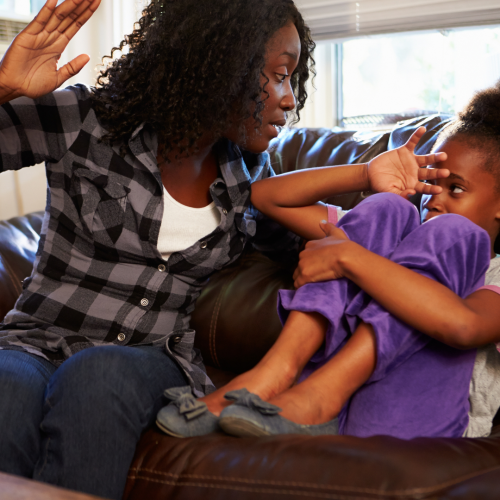As parents, even the best of us sometimes find ourselves yielding to negative impulses and reactions, which cause us to behave in unhelpful ways towards our children. It is always hard to pinpoint where these impulses and reactions come from. Try as we may, we find it difficult or almost impossible to curb these negative impulses and reactions often brought on by certain behaviours our children display.
Take Maggie, for example; Maggie is an excellent mother. She makes many sacrifices, puts her family first and always ensures that all of her daughter’s needs are met. However, she often has outbursts of anger in response to certain things her 5-year-old daughter, Judy, does. Maggie’s first reaction is usually to raise her voice, and sometimes the situation escalates to the point where Judy ends up in tears. Once Maggie cools off, she realises the impact of her actions and, in the clear light of day, recognises that her reaction to Judy’s behaviour is undeserving. She is often ridden with shame and guilt; Maggie cannot understand why she keeps doing this. She wakes every morning ready to be a fantastic, gentle mother. She has been following the principles of a more delicate style of parenting, which she read about a few months ago. The guides work well, except when Maggie loses control of her emotions whenever something Judy does triggers her unpleasant feelings and reactions. Maggie keeps promising herself that the next time Judy misbehaves, she will not yield to the impulse to shout and scream at Judy but unfortunately, she keeps falling back into the same old habit.
Many parents have similar emotional impulses and reactions, and they always struggle to make sense of them. But they keep repeating these reactions despite their best efforts to make positive change. Our natural response is to handle this by dealing directly with the impulses/feelings/reactions. Although this may work occasionally, the results are temporary and often ineffective. These undesirable feelings and impulsive reactions are usually caused by what we refer to as parenting triggers. They blindside us, sabotage our positive parenting efforts and consume us with parental guilt.
What Are Parenting Triggers?
Parenting triggers are those events that ignite unhelpful impulses and reactions towards our children. Causing to arise in us unconscious fears, shame, insecurities, traumas, and hurt from our past, but mainly from our early life. Responses appear in the form of anger, frustration, intolerance, upset, sadness and helplessness. We hold those past hurts and traumas in what psychologist Carl Jung called the Shadow. The Shadow refers to that place within our psyche where we have the deepest wounds and parts of ourselves we prefer to keep out of our consciousness because we do not want to know about them or remember them. These develop out of cultural and societal expectations and personal experiences, which may have traumatised us on various levels. We repress these ugly feelings and experiences in the shadows, where they reside out of sight but never without consequence. But our wounds want us to recognise that they are there and are still a part of us. They want to be dealt with. When these wounds are left unattended, they fester. They rear their heads when we least expect them and cause us to behave in ways we would describe as out of character.
How Do These Triggers Affect Our Parenting?
Unfortunately, or fortunately, our children seem to be the masters of helping to unearth these old buried wounds. And sometimes it’s because we were not taught as children how to process our emotions healthily, because we want to protect our children or because we are afraid of being hurt again. Maybe you were never allowed to show excitement, be silly or be your authentic self as a child. You may have been told often that children are to be “seen and not heard”, so you repressed the parts of you that wanted to squeal with delight and do cartwheels at the prospect of something exciting happening or just be silly; because they were unacceptable. You eventually became the impassive, stoic person you are today. But, somewhere deep inside is that child who wants to show her excitement about life. If you then go on to become the mother of a child who shows unhindered excitement, this may set off a trigger. Alternatively, you may be triggered by an opinionated child because you were not allowed to express your thoughts and feelings when you were younger, on account that it was considered disrespectful. Our triggers may arise out of fear of being hurt again or out of fear of our children being shamed, belittled or hurt by others. Ironically, in an attempt to save them from being stretched, we hurt them by ourselves because of our uncontrolled repressed wounds.
Triggers come in all shapes, sizes and responses. For example, a child not eating every last morsel of food on their plate can trigger fears and shame about ill health, waste, scarcity and poverty in their parent. The fear that this could happen again or the feelings of shame towards it could influence a far more inflated response than necessary. Children with wild imaginations may trigger feelings of being shamed as a child, possibly being called a liar for having had the same wild imaginations. Children who talk back may trigger feelings of fear around losing control or shame around being shut up as a child. You may find listening to a child cry intolerable because it triggers the feeling of not being consoled as a child, maybe getting in trouble for crying or being forced to hide your feelings. After all, “big boys or big girls don’t cry“.
The esteemed paediatrician and psychoanalyst D. W Winnicott said in his now famous book Playing and Reality that a child needs a “good enough mother”. A good enough mother to him is not a perfect mother, nor is she a mother who settles for a mediocre parenting style. A good enough mother is a mother who is attuned to the needs of her child and meets those needs—providing her child with a sense of safety. She is a mother who allows for manageable amounts of frustrations to facilitate the development of a sense of individuality, an understanding of a world outside of his mother, and the resilience to live in an imperfect world. However, even while allowing these frustrations, the good enough mother is always tuned to her child, and a theme of empathy and affection is consistent throughout her parenting, which allows for reparation.
The big problem with parenting triggers is that they can derail our ‘reasonable enough’ parenting efforts and steal from us the opportunity to parent in the way we know to be best. Without conscious efforts, our repressed parts will force their way to the surface in an uncontrolled way and can cause damage to our relationships and our children. The important thing is to recognise when you have been triggered and understand that this is not about your child but about you. When you notice a trigger, it’s time to take action.
How Do We Take Action?
First, you have to learn how to identify these triggers. There are several ways to do this:
1. If you find yourself excessively angry at your child, it’s a sure sign that a trigger has been activated.
2. If you find that after you calm down, you recognise that your response was out of proportion to the situation or incident, then it is likely that a trigger has been activated.
3. If behaviour from a young child produces deep sadness in you, you have reacted to a trigger.
4. If you feel that, “this seems familiar. I know this feeling very well”. If you think that you’ve unfortunately reacted in an undesirable way many times before, then a trigger has been activated.
5. If you find that your reaction to your child’s behaviour is to hurt them by smacking, beating or shouting at them. Whether or not you yield to the temptation, you need to recognise it as a trigger.
The next step is to find out those fears and insecurities that hide under the mask of anger, intolerance, sadness, and pride.
You can shine a light on those hidden culprits using some or all of these methods:
1. Take note of your triggers; take a step back and observe what happened. Note when and how it happened. Process those feelings. Are you angry, Annoyed, scared, or sad? How do you feel physically?
2. Recognise that the trigger is not about your child; they did not create the bad feelings. This is about your past and the pain your inner child still holds on to that has been suppressed so deeply but wants to be heard.
3. Stop yourself in the middle of a trigger. Then, if it’s safe and appropriate to do so, step away from your child and into a quiet, calm space. Breathe. Remind yourself that you are safe and in control of the situation.
4. Making peace with your past hurts.
5. Share your feelings and concerns with a trusted friend.
6. Try journaling. Reflective writing, free writing or stream-of-consciousness writing can all work.
7. Speak to a parenting coach who is experienced in working with parenting triggers and can help with inner child work.
If you need further professional help, speak with a qualified therapist.
For more parenting information, tips and support, visit The Whole Parenting.





I do experience this most times thanks.